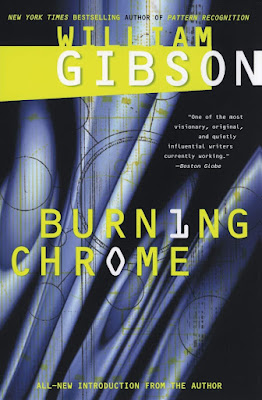Burning Chrome
by William Gibson
1986, reprinted 2003
Burning Chrome is William Gibson's first collection of short stories. I read it because a friend recommended "Hinterland" to me, and then I kept going. "Hinterland" is a much darker take on the same premise as Frederick Pohl's Gateway, about future humans finding alien transportation technology, and traveling far away to search for science treasures.
Most of Gibson's stories either explicitly or plausibly take place in the same kind of depressing near-future America, although none of the characters or locations are repeated. Gibson's signature technology, which shows up in nearly every story, are computers that can plug in to the human brain, with the merger providing more processing power than either could achieve alone. This leads to 'feelies' becoming the most popular form of entertainment - recordings of another person's subjective experiences, what it 'feels like' to be them.
His most common story structure is an unfolding present day scene intercut with flashbacks that eventually provide the context you need to understand the conclusion of the present.
The best stories, probably, are "Burning Chrome," "Winter Market," and "Dogfight."
"Burning Chrome" is part of the so-called Sprawl trilogy, along with "Johnny Mnemonic" and "New Rose Hotel." It's maybe the quintessential cyberpunk hacker story. A pair of hackers get some stolen military tech and use it to boost their computer setup to the point where they can successfully hack an organized crime boss. One of the hackers has an unrequited crush on a woman who wants to get her eyes replaced with cameras so she become an actress in the feelie industry.
"Winter Market" is about a video editor who has an unrequited crush on the feelie artist he edits for. In flashbacks, she's dying of a terminal illness and working on her magnum opus, a recording of her sadness and rage about dying. In the present day she's dead, but also maybe digitally immortal, having used the proceeds of her opus to pay to have her mind uploaded onto a giant corporate computer.
"Dogfight" is about an unemployed drifter who decides he wants to win at video-games, specifically a WWI-era biplane dogfight simulator that uses brain-merger controllers and displays as holograms projected into the playing space. (A little bit like the game Data plays in the ST:TNG episode "Peak Performance.") Most of the players are veteran pilots with actual combat experience and superhuman reflexes thanks to the dangerous drugs the military gave them when they actually flew. The drifter befriends a college student, but when he has the chance to win an 'important' game, rapes her and steals her stash of performance-enhancing study drugs. His win takes away his veteran opponent's last reason to live. To his credit, Gibson is aware that this protagonist turns himself into a monster to win, and that his victory is both meaningless and hollow.
Most of the other stories are good, but I'd skip "The Gernsbach Continuum," "Ten Fragments of a Holographic Rose," and "The Belonging Kind." "Red Star, Winter Orbit" is kind of on the cusp of being worth it.

No comments:
Post a Comment